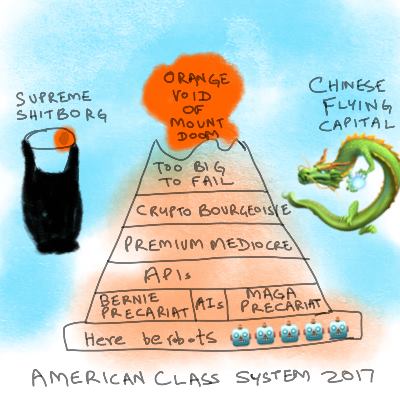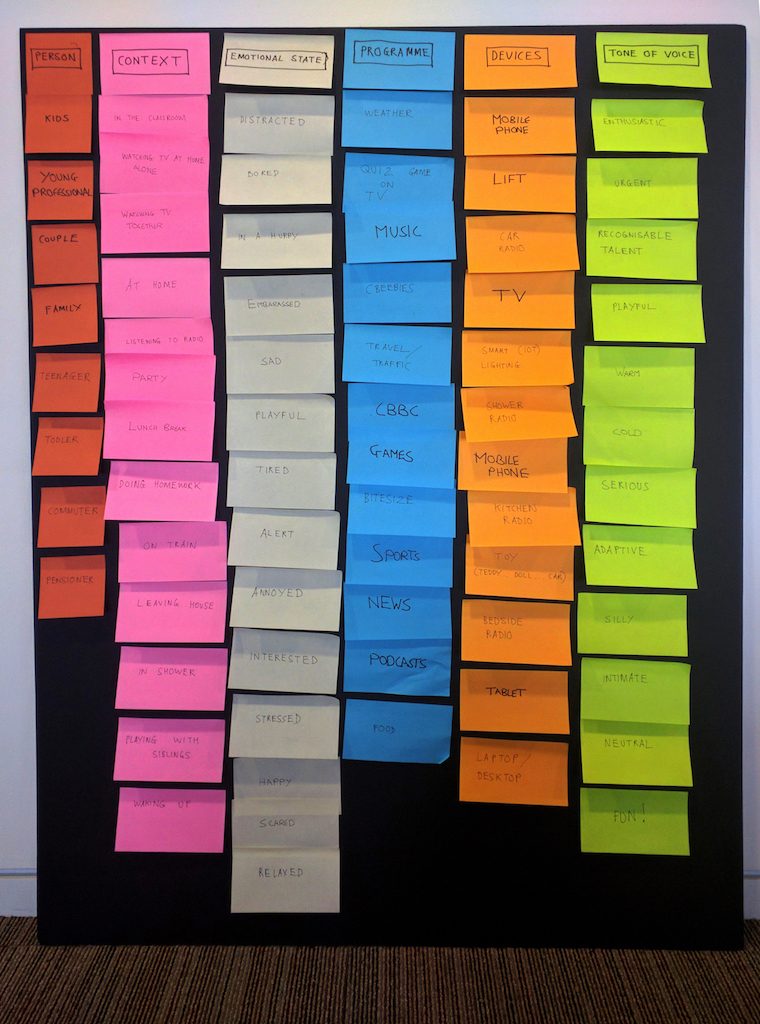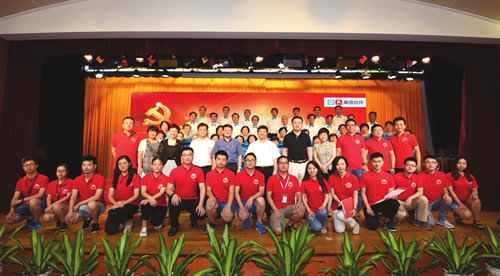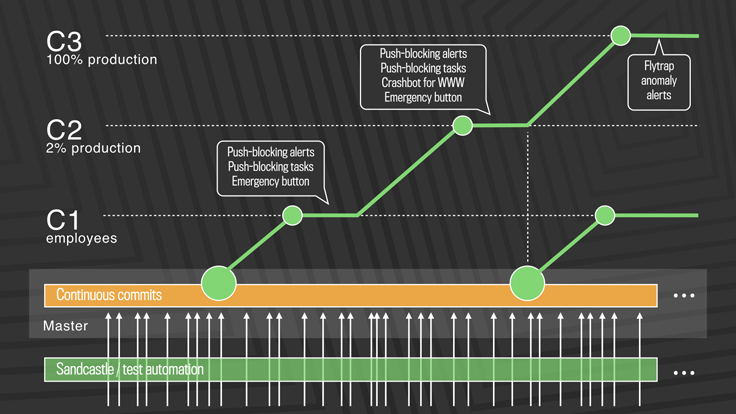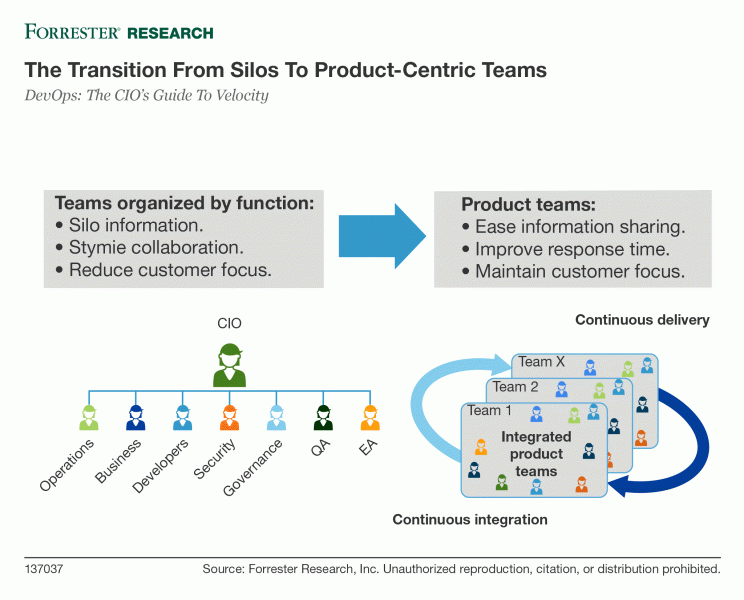Premium Mediocrity
[avatar user=”malm” size=”small” align=”left” link=”file” /]
Technological unemployment is not so much destroying jobs as warping the fabric of the workplace. As automation of workflows accelerates, it is becoming clearer that middle-class jobs will be hollowed out for reasons Larry Elliott of the Guardian outlines in this article. Essentially because of Moravec’s Paradox that “robots find the difficult things easy and the easy things difficult” it’s likely that many who had comfortable lower-middle class positions will find their livelihoods increasingly imperiled. Moravec’s Paradox also helps explain a related paradox – namely why is it that the brightest and best in the world’s leading economies seem set on a path that will decimate the next generation of jobs in developing nations in Africa and Asia. Many of those jobs would otherwise be respectable middle class ones and being closed out from access to them will shift many of those affected into a new social tier sitting just above and uncomfortably close to the Precariat. Welcome to the world of Premium Mediocrity captured brilliantly in this recent post:
At its broad, fuzzy edges, premium mediocre is an expansive concept; a global, cosmopolitan and nationalist cultural Big Tent: it is arguably both suburban andneourban, Red and Blue, containing Boomers and X’ers. It includes bluetooth headsets favored by Red State farmers and the tiki torches — designed for premium mediocre backyard barbecues — favored by your friendly neighborhood Nazis. It includes everything Trump-branded. It covers McMansions, insecure suburbia-dwelling Dodge Stratus owners and Bed, Bath, and Beyond shoppers. It includes gentrifying neighborhoods and ghost-town malls. It includes Netflix and chill. It includes Blue Apron meals.
The Premium Mediocre also sit uncomfortably close to the dreaded automation API and are increasingly aware of the Precariat breathing down their necks:
“Today, you’re either above the API or below the API. You either tell robots what to do, or are told by robots what to do. To crash through the API, and into what I previously termed the Jeffersonian middle class, is to go from being predator to prey in the locust economy.“
The dark dystopian winter onset of technological unemployment is not just coming. It’s already here and we’re all in it. The parcelling of human work into smaller increments is expanding. It’s a waymarker to a future in which whole sections of society are subsumed below an API that Uber, TaskRabbit, MechanicalTurk have already played with at the edges. Almost a century on from Chaplin’s masterpiece Modern Times, humans seem once again to be cogs in mass scale automation machinery. It’s feels inevitable that disenfranchisement resulting from growing inequality will lead to militancy from the Precariat have-nots that have slid beyond the API event horizon:
Something has to give. Political leadership emanating bottom up from labour movements is a distinct possibility. One hundred years on from Red October the prospect of Communism 2.0 feels distinct and plausible as more and more fall under the automation API and realise they’ve been cheated. When they do, the backlash against those at the top of the class pyramid may get really ugly. As in revolutions past, this one is likely to be presaged by human feet on the street and streamed on social media but beyond that a lot remains unclear. Recent developments showing how Facebook was used to groom the US electorate in 2016 should give us all cause for concern:
Automation and artificial intelligence are going to have a big impact in all kinds of worlds. These technologies are new and real and they are coming soon. Facebook is deeply interested in these trends. We don’t know where this is going, we don’t know what the social costs and consequences will be, we don’t know what will be the next area of life to be hollowed out, the next business model to be destroyed, the next company to go the way of Polaroid or the next business to go the way of journalism or the next set of tools and techniques to become available to the people who used Facebook to manipulate the elections of 2016. We just don’t know what’s next, but we know it’s likely to be consequential, and that a big part will be played by the world’s biggest social network. On the evidence of Facebook’s actions so far, it’s impossible to face this prospect without unease.
Thinking about these things helps frame the narratives heading our way. Relatedly, this post underscores the belief that innovation and optimism are distinct sources of human capital in society and that access to sci-fi and skeptical thinking can help build innovation capacity in society. It’s going to be needed in large quantities in the years to come:
In addition to education levels, human capital models should consider factors like optimism, imagination, and hope for the future. When I say “positive” vision, I don’t mean that people must see the future as a cheerful one.
Instead, I’m saying that people ought to have a vision at all: A clear sense of how the technological future will be different from today. To have a positive vision, people must first expand their imaginations. And I submit that an interest in science fiction, the material world, and proximity to industry all help to refine that optimism. I mean to promote imagination by direct injection.
Machine Learning
Tryolabs outline the history and the current state of Object Detection, one of the most popular and practical tasks in Computer Vision from the classical approach using Haar filters up to deep learning approaches building on convolutional neural networks.
Wired on the Netflix recommendation algorithm and how it is a three-legged stool that relies upon user “taste communities” to watch and tag mountains of film content:
The three legs of this stool would be Netflix members; taggers who understand everything about the content; and our machine learning algorithms that take all of the data and put things together
Amazon
Microsoft and Amazon are partnering in the very loosest sense on Cortana and Alexa:
As first reported by The New York Times, someone using an Alexa device will have to say “Alexa, open Cortana” to get talk to Microsoft’s digital assistant, and someone using Cortana will have to say “Cortana, open Alexa” to talk to Amazon’s. It appears that both companies have simply created skills on each others platforms to enable the basic integration.
Amazon have also partnered with niche UK smartphone brand WileyFox to bring Alexa to their Swift range in a more meaningful and interesting integration:
Alexa will arrive on the Wileyfox Swift 2, Swift 2 Plus and Swift 2 X via a free over-the-air software update, which will give users the choice between using Google’s Assistant and Amazon’s offering.
You’ll be able to choice which assistant is your default by diving into the settings of the phone, and like Google, you’ll be able to wake your Wileyfox by saying the command word “Alexa”.
The BBC has found a novel use for Alexa functionality in building “an original interactive audio drama pilot for voice devices”. Following the links unearths an interesting post discussing some of the challenges around designing for voice-based UIs which contains this collection of brainstorming post-its examining people, context and devices:
Amazon and Apple appear to be in a race to sign James Bond film rights in what could be a watershed moment for SVOD.

The shocking sudden death of Elemental co-founder and CEO Sam Blackman at a relatively young age is a sobering reminder of mortality as well as a huge blow to this recent Amazon acquisition and AWS subsidiary.
Android
Arstechnica throughly reviewed Android 8.0 covering: a) Project Treble, Google’s attempt to cleanly re-engineer the separation of concerns between SoC vendor, OEM and Android, b) notification improvements, c) background processing, d) security and e) various other performance and system UI improvements. The Project Treble section is fascinating and well worth reading for anyone familiar with Google’s CTS (Compatibility Test Suite) approach for policing OEM Android implementations. Google will introduce a new Vendor Test Suite (VTS) that will police the Hardware Abstraction Layer (HAL) in a similar manner promising a future where OS updates can be done on top without necessitating parallel OEM/SoC firmware updates.
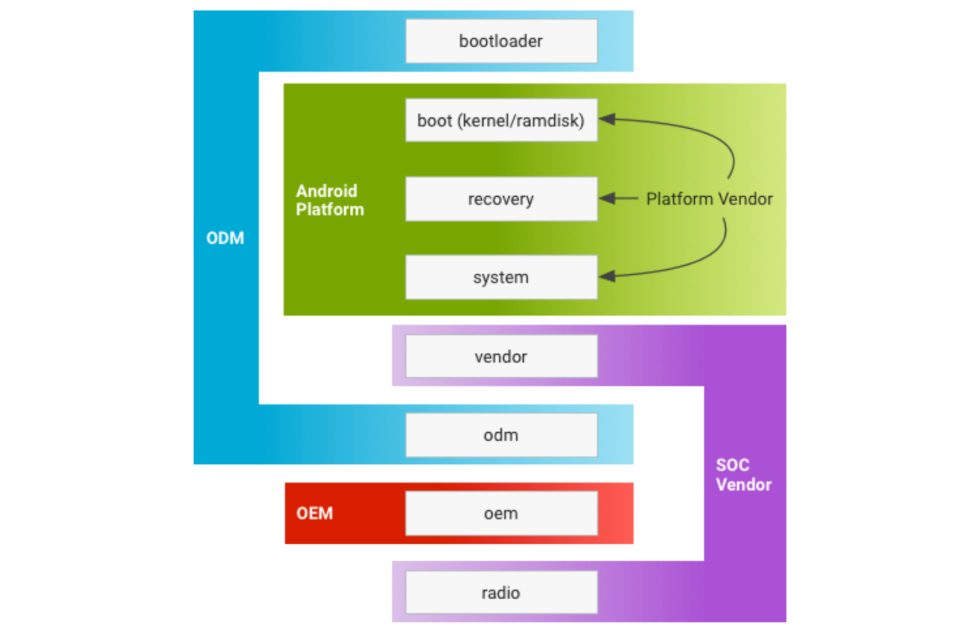
China
Following on from last week’s post on the Chinese way, another profound example of it in action. Chinese firms are increasingly setting up Communist Party Committees within the workplace:
More and more Chinese tech companies have been setting up CPC branches recently, a way to better communicate with authorities while enhancing corporate management.
Software Engineering
Rapid release at massive scale at Facebook and how it is underpinned by a combination of sophisticated tooling, test automation, automated promotion and continuous development oriented engineering culture:
Forrester claim that Devops “has now reached escape velocity and CIOs need to get on board” in a post that seems aimed at large Enterprise customers which positions the movement firmly within a business-friendly context of Lean working:
What should recruiters prioritise when hiring developers? Feedback from real-world devs on StackOverflow suggests communications skills and a track record of getting things done are more important than knowing about data structures and algorithms:
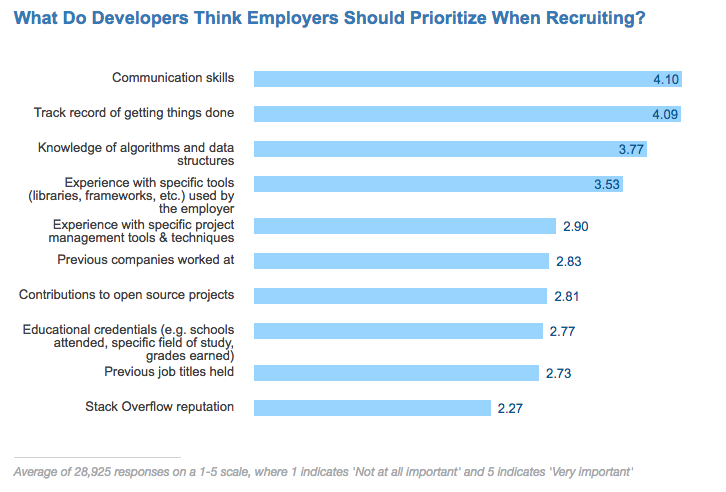 This recent LinkedIn post suggests that anyone sticking at a job for over two years in the 10 biggest companies in tech is beating the averages. It’s not clear how accurate the data here is but it is profoundly impactful in terms of the corresponding downstream impact. No wonder there is so much focus on hiring in these outfits:
This recent LinkedIn post suggests that anyone sticking at a job for over two years in the 10 biggest companies in tech is beating the averages. It’s not clear how accurate the data here is but it is profoundly impactful in terms of the corresponding downstream impact. No wonder there is so much focus on hiring in these outfits:
Facebook: 2.02 years Google: 1.90 years Oracle: 1.89 years Apple: 1.85 years Amazon: 1.84 years Twitter: 1.83 years Microsoft: 1.81 years Airbnb: 1.64 years Snap Inc.: 1.62 years Uber: 1.23 years
Culture and Society
This Flipboard post suggests the purpose of life isn’t “happiness” or the destination but the journey itself and the narrative you build around it:
The narrative you tell will determine the kind of hurdles your life invites, and clearing these hurdles is ultimately what gives the emotions you feel any sort of real meaning. That’s how their value is earned.
Raising mentally strong children involves getting them to think realistically, manage their emotions and take positive action:
Challenges, hardship, and setbacks are inevitable. Teaching kids to build mental musclehelps them become resilient. It’s also the key to helping them reach their greatest potential in life.
The ten most serious problems in the world according to Millennials courtesy of a World Economic Forum survey:
1. Climate change / destruction of nature (48.8%)
2. Large scale conflict / wars (38.9%)
3. Inequality (income, discrimination) (30.8%)
4. Poverty (29.2%)
5. Religious conflicts (23.9%)
6. Government accountability and transparency / corruption (22.7%)
7. Food and water security (18.2%)
8. Lack of education (15.9%)
9. Safety / security / wellbeing (14.1%)
10. Lack of economic opportunity and employment (12.1%)
Private Eye 70 years on from Partition hilariously suggest it’s the answer for an irrevocably divided post-Brexit UK too – Brexitania and Remoania:
This is hilarious #Brexit #PrivateEye pic.twitter.com/0ZJVEmNl5k
— Gabriel Gatehouse (@ggatehouse) September 2, 2017
